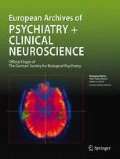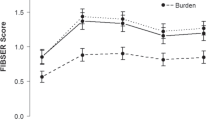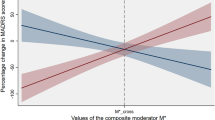Abstract
Relapse of major depressive disorder (MDD) is a common clinical problem. Identifying relapse predictors could lead to strategies that reduce relapse risk. This study is designed to determine whether residual symptoms predict relapse risk during the continuation/maintenance treatment of MDD. 570 MDD patients received open-label fluoxetine for 12 weeks. Under double blind conditions, 262 patients who responded by week 12 were randomly assigned to continue fluoxetine or switch to placebo for 52 weeks or until relapse. Residual symptoms were measured using the Symptom Checklist-90 and the Symptom Questionnaire. The relationship between residual symptom severity and relapse risk was assessed. Without adjusting for overall residual symptom severity, a greater severity of residual obsessive-compulsive and phobic anxiety symptoms predicted greater relapse risk. After adjusting for overall residual symptom severity, only severity of phobic anxiety symptoms predicted relapse risk. The predictive value of phobic anxiety symptoms with respect to relapse risk was independent of treatment assignment. The results indicated that there may be a specific pattern of residual symptoms associated with depressive relapse during antidepressant continuation/maintenance, which is unrelated to treatment assignment. Future studies are needed to further explore the relationship between residual symptoms and relapse risk in MDD. Clinical implications: (1) It is important to treat residual symptoms among antidepressant responders/remitters in order to decrease relapse risk. (2) Clinicians should target residual phobic anxiety symptoms in order to decrease relapse risk. (3) Clinicians should target residual obsessive-compulsive symptoms in order to decrease relapse risk. Limitations: (1) limited generalizability due to inclusion/exclusion criteria; (2) lack of active comparator treatment group; (3) post hoc analysis.
Similar content being viewed by others
References
Kessler R, Berglund P, Demler O et al (2003) The epidemiology of major depressive disorder: results from the National Comorbidity Survey Replication (NCS-R). JAMA 289(23):3095–3105
Trivedi M, Rush A, Wisniewski S et al (2006) Evaluation of outcomes with Citalopram for depression using measurement-based care in STAR*D: implications for clinical practice. Am J Psychiatry 163:28–40
Geddes J, Carney S, Davies C et al (2003) Relapse prevention with antidepressant drug treatment in depressive disorders: a systematic review. Lancet 361(9358):653–661
Paykel E, Ramana R, Cooper Z et al (1995) Residual symptoms after partial remission: an important outcome in depression. Psychol Med 25(6):1171–1180
Kennedy N, Paykel E (2004) Residual symptoms at remission from depression: impact on long-term outcome. J Affect Disord 80:135–144
Judd L, Akiskal H, Maser J et al (1998) Major depressive disorder: a prospective study of residual subthreshold depressive symptoms as predictor of rapid relapse. J Affect Disord 50:97–108
Judd L, Paulus M, Schettler P et al (2000) Does incomplete recovery from first lifetime major depressive episode herald a chronic course of illness? Am J Psychiatry 157:1501–1504
Judd L, Schettler P, Hagop A et al (2008) Residual symptom recovery from major affective episodes in bipolar disorders and rapid episode relapse/recurrence. Arch Gen Psychiatry 65(4):386–394
Rush A, Trivedi M, Wisniewski S et al (2006) Acute and longer-term outcomes in depressed outpatients requiring one or several treatment steps: a STAR*D report. Am J Psychiatry 163:1905–1917
Dombrovski A, Mulsant B, Houck P et al (2007) Residual symptoms and recurrence during maintenance treatment of late life depression. J Affect Disord 103:77–82
McGrath P, Stewart J, Quitkin F et al (2006) Predictors of relapse in a prospective study of fluoxetine treatment of major depression. Am J Psychiatry 163:1542–1548
First M, Spitzer R, Gibbon M et al (1995) Structured clinical interview for DSM-IV axis I disorders-Patient Edition (SCID-I/P, Version 2.0). In: Biometrics Research Department, New York State Psychiatric Institute, New York
Guy W (1976) ECDEU Assessment manual for psychopharmacology, revised. In: National Institute of Mental Health, Rockville, MD
Kellner R (1987) A symptom questionnaire. J Clin Psychiatry 48:268–274
Derogatis L, Lipman R, Rickels K et al (1974) The Hopkins symptom checklist (HSCL): a self-report symptom inventory. J Appl Behav Sci 19:1–15
Hamilton M (1960) A rating scale for depression. J Neurol Neurosurg Psychiatry 23:56–62
Author information
Authors and Affiliations
Corresponding author
Rights and permissions
About this article
Cite this article
Yang, H., Chuzi, S., Sinicropi-Yao, L. et al. Type of residual symptom and risk of relapse during the continuation/maintenance phase treatment of major depressive disorder with the selective serotonin reuptake inhibitor fluoxetine. Eur Arch Psychiatry Clin Neurosci 260, 145–150 (2010). https://doi.org/10.1007/s00406-009-0031-3
Received:
Accepted:
Published:
Issue Date:
DOI: https://doi.org/10.1007/s00406-009-0031-3




